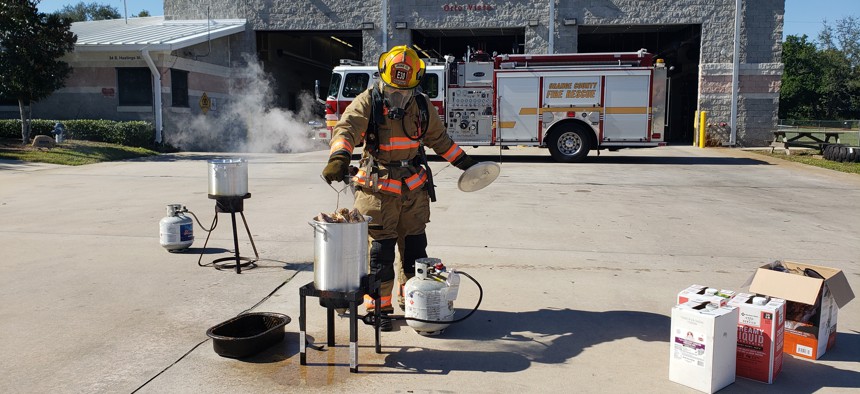Local Governments Offer Tips on Deep Frying a Thanksgiving Turkey Without Burning the House Down

An firefighter from the Orange County Fire Rescue demonstrates how to deep fry a turkey as part of a public safety campaign. Mike Jachles/Orange County Fire Rescue

Connecting state and local government leaders
Every year, people run into problems frying turkeys. Fire departments and other local officials have suggestions on how to prevent serious mishaps.
Washington State Rep. and former Snohomish County Sheriff John Lovick knows the allure of a crispy, deep-fried Thanksgiving turkey.
Since an uncle in Texas taught him the family recipe in 2004, Lovick estimates he’s fried more than 3,500 birds—for charity events, to give away to friends and to serve at his own Thanksgiving table.
“You have to really stick your neck out to deep fry turkey,” said Lovick, who is always ready with the turkey quips. “If you do it right, it is going to taste good.”
But frying a turkey in 350-degree oil is a challenge, too often resulting in fires, burns or spills, and Lovick urges both experienced and inexperienced cooks to take a number of precautions.
More home cooking fires occur on Thanksgiving than any other day in the United States, with fire departments responding to more than 1,600 home cooking fires in 2017, according to the National Fire Protection Safety Association. It’s unclear how many of those fires stem from deep-frying incidents, but they happen frequently enough that fire departments across the country deploy public safety campaigns this time of year to warn residents about the potential hazards.
The Anne Arundel County Fire Department in Maryland responded to at least one turkey fryer fire in 2018, which caught a deck on fire but was extinguished by residents, according to media reports.
In Orange County, Florida, the local fire department conducts annual public safety demonstrations to show both the right and wrong way to deep fry a turkey. A video example of the “wrong way,” showcased on social media, depicts a fully-suited firefighter dunking a frozen turkey into a pot of boiling oil. The oil sputters and overflows onto the concrete when the bird is dunked in the pot and suddenly the whole thing goes up in flames.
“The deep fryers are very popular in the south. It is considered a delicacy, deep-fried turkey,” said Mike Jachles, the public information officer for Orange County Fire and Rescue. “The issue is that we’ve seen a lot of injuries and fires caused by these appliances.”
Jaches said his department generally recommends that residents leave their turkey frying to professionals, and either buy a fried turkey or take it to a restaurant to have it prepared. But he knows there are always going to be some folks who like to cook it themselves.
“While we discourage their use, we know people are going to use them so we hope by promoting the safety message people will have safety on the front of their mind when using these appliances,” he said.
Among the tips that both Jachles and Lovick shared:
- Fully defrost the turkey and dry it before placing in oil.
- Measure the amount of oil needed in the pot so that the turkey is submerged but the oil does not overflow.
- Slowly lower the turkey into the oil to reduce spattering.
- Only use deep fryers outdoors on even ground away from any housing or structures.
- Do not leave a cooking turkey unattended and keep a fire extinguisher nearby.
Lovick, who plans to cook four turkeys for friends on Tuesday and widely shares his family recipe and tips, said he doesn’t let anyone within a 20-foot radius when he’s frying. Of the thousands of birds he’s fried over the years, he remembers one close call that he chalks up to “operator error.” He put on gloves that didn’t cover his full arm, and was burned by hot oil when he lowered the turkey into the oil.
The oil is hot enough to burn skin long before and after its used to fry a turkey, so wearing protective gear is important, said Captain Nick Hickson, of the Brazos County Volunteer Fire Department in Texas.
“The biggest thing with turkey fryers is that people need to get them away from the house. Don’t try to do it on your porch or in your garage, definitely, do not try to do it inside,” Burnett told KBTX-TV. “You want to have it away from the house because if it does flash, you can step away from it, put it out, and use your fire extinguisher.”
Frying a turkey can require several gallons of peanut oil and in addition to providing safety tips, some municipalities also offer residents options for disposing of the oil.
In Austin, Texas, residents can bring cooking oil to the city’s Recycle and Reuse Drop-Off Center. The city collects more than 12,000 gallons of cooking oil and grease each year, with a surge around the holidays. Vendors pick up the oil, which is processed into biodiesel.
By offering oil recycling, the city keeps the excess grease out of city water pipes where it can solidify and clog water lines.
Andrea Noble is a staff correspondent with Route Fifty.

NEXT STORY: Planting a Family of Trees, One Seedling at a Time




